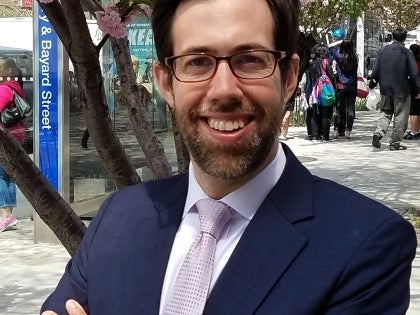
Public housing tenants demand repairs, full funding
By Lesley Sussman
Feature article in The Villager
Hundreds of residents who live in public housing throughout the city were expected to converge at City Hall on Thursday morning Nov. 12, along with politicians and organizers, to demand that Governor Paterson include ample funding for the New York City Housing Authority in the budget due for release in December.
The rally was part of the Save Our Underfunded NYCHA Developments, or SOUND, campaign spearheaded by Assemblyman Brian Kavanagh, state Senator Daniel Squadron and Good Old Lower East Side (GOLES), a neighborhood housing and preservation organization.
In past months, smaller rallies have been held throughout the state urging full funding for public housing. NYCHA is facing a $200 million budget shortfall this year due to increasing costs and failure on all levels of government to provide adequate funding. NYCHA is home to approximately 175,000 residents.
The City Hall rally followed a community forum held on Thurs., Nov. 5, at the Grand Street Settlement, 80 Pitt St., during which nearly 100 local public housing residents listened to Kavanagh and Squadron — who were joined by representatives of other political leaders, including Assembly Speaker Sheldon Silver — demand that the state and city of New York fully fund NYCHA.
Public housing residents at the meeting said they were fed up with having to wait months for apartment repairs and weeks for broken elevators to be fixed, along with overcrowded apartments and garbage piles, all because NYCHA was short of money.
Lisa Burris, director of organizing for PHROLES (Public Housing Residents of the Lower East Side — an offshoot of GOLES), listened as one elderly woman stood up to describe how she was unable to get up to her apartment for her medication because the elevator in her Samuel Gompers Housing Development building was broken. The woman, who asked not to be identified, said, “I was waiting in the lobby from the afternoon until 2 a.m for them to fix the elevator.”
“This is the kind of stuff that’s happening to seniors and others in public housing because there is no funding for elevator repairs,” Burris angrily told the forum. “People are not only complaining about delays in elevator repairs, but sometimes it takes from three months to a year for apartment repairs. Living conditions are getting worse every day.”
Luther Stubblefield, vice president of the Bernard Baruch Houses Tenants Association, said these are not exaggerated conditions.
“In all the developments on the Lower East Side, mold is one of the biggest problems, along with falling plaster and leaks, and nothing is being done about it because the funding isn’t there,” he said.
Stubblefield told the audience that while the participation of so many elected officials in the SOUND public housing campaign was welcomed, “They can’t help solve all our problems. We have to join together, stand up and be seen, stand up to be heard, and stand up to be somebody,” he said. “Complaining to each other isn’t going to achieve anything.”
Earlier in the meeting, Kavanagh told public housing residents, “If you live in public housing, you’re seeing the downside of it. It’s through these kinds of meetings that we’re trying to change that.” The assemblymember said the goal of the SOUND campaign was to try and form “one big coalition” in support of public housing.
So far, he added, 75 elected officials — including Councilmember Rosie Mendez, newly elected Councilmember Margaret Chin and Manhattan Borough President Scott Stringer — have come aboard the effort.
Squadron, meanwhile, told residents he is concerned that NYCHA doesn’t have enough money to do all the things necessary “that will make you safe and well cared for in your homes.”
The state senator said he was well aware that elevators in housing developments weren’t working, staff were being laid off, roofs were leaking and that tenants were waiting too long for repairs.
“We have to change and fix that,” he said.
The SOUND campaign is calling upon the state and city to fully fund $64 million for state-built public housing developments, $30 million for city-built developments, to stop requiring that NYCHA pay more than $70 million for police and sanitation services, and to invest $100 million in federal stimulus funds for weatherization of housing developments.



